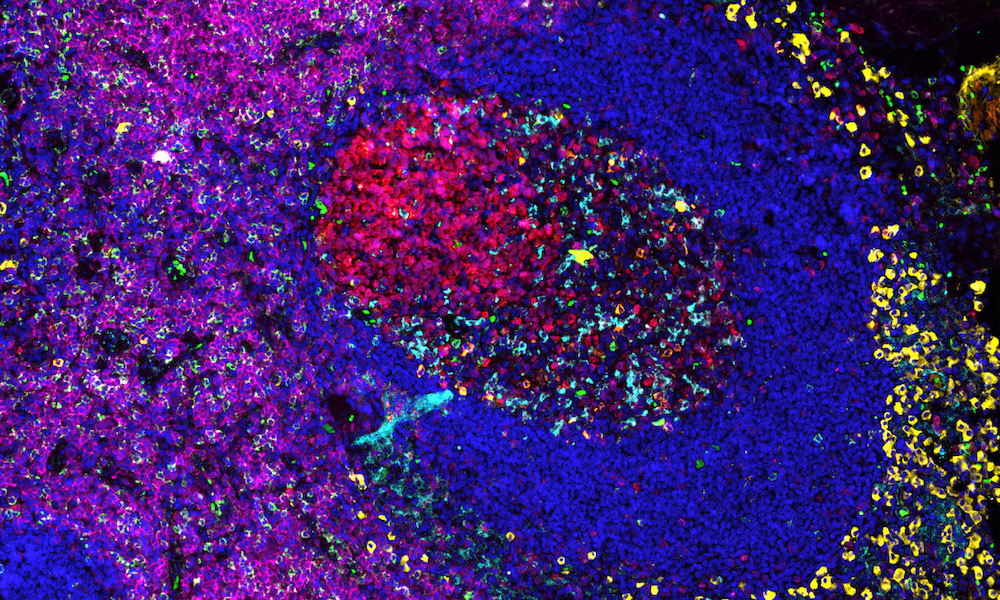Cell Biology and Omics for Educators
Virtual LearningLAB
- Overview
- Organiser
- Learning formats & assignment
- Requirements, certificates and cancellations
- Application
- Schedule
Overview
Since Robert Hooke’s discovery of cells in 1665, our understanding of these smallest living units of life has been transformed. Advances in omics technologies have shown how cells and their components orchestrate diverse functions across different levels of organisation, revealing complexities far beyond the initial perception of being like small rooms, which earned them their name.
Nowadays, omics methodologies help researchers map complex interactions and understand how cells function in health and disease.
This winter, EMBL’s Science Education and Public Engagement team in partnership with Merck, invites secondary school science teachers to explore this topic in a virtual training course entitled “Cell Biology and Omics for Educators”.
This professional development course provides an overview of the development of the field of cell biology, insights into the latest advances made possible with omics techniques, and inspiration for teaching the topic in the classroom.
Course Duration: two weeks, from 29 September to 12 October 2025
Language: Conducted in English
Application Deadline: 21 September 2025
Workload: 10 hours (5 hours per week), with an additional week for assignment submission
No Cost: free of charge
The two-week course is a mix of self-study and live interactive sessions that allow educators to immerse themselves in the fascinating world of cell biology and omics from the comfort of their own homes. The course is designed to enhance educators’ teaching skills with insights into the latest developments in the field and to connect educators worldwide in live sessions, fostering a collaborative and supportive community.
During the first week of the course, educators will be introduced to the latest tools and approaches that are transforming the study of cells. From advanced imaging to a range of omics techniques, participants explore how researchers at EMBL are uncovering the structure and behaviour of cells and revealing the molecular changes linked to disease.
In the second week, educators move from theory to practice, immersing themselves in a collection of resources for teaching cell biology and a new pedagogical resource designed to build students’ understanding of cellular organisation and the concept of structure and function through paper & computer-based activities. These focus on live imaging and electron microscopy data of the marine worm (Platynereis dumerilii) and use a Fiji-based microscopy data visualisation plugin to dive into the world of gene expression.
Upon completing the course, participants will:
- Describe how advanced imaging and spatial omics technologies are used to investigate cell structure and function
- Analyse how omics technologies contribute to biomedical research, using examples from studies on cancer or pulmonary disease
- Familiarise themselves with an educational classroom resource with an emphasis on the structure and function of cells and organelles, electron microscopy and gene expression analysis
- Be equipped with a computer-based tool to visualise and analyse electron microscopy and gene expression data in the classroom
Furthermore, the course offers participants the chance to:
- Connect with active researchers in the field, providing insights and perspectives from the forefront of cell biology
- Expand their toolbox of teaching materials for addressing topics related to cell biology
- Become part of an international community of teachers and science educators, fostering knowledge exchange
Organiser
This training course is organised by EMBL’s Science Education and Public Engagement office in collaboration with Merck.
EMBL Science Education and Public Engagement
EMBL’s Science Education and Public Engagement office shares the scientific discoveries of EMBL with young people, teachers and the diverse public in Europe and beyond. Our education programmes convey complex, cutting-edge topics in life science research excitingly and insightfully, fostering the discovery of current research trends, the scientific method, and scientific career paths. Our teacher training courses empower educators to bring modern life sciences into the classroom. Visit our website for further information about our activities.

Merck, a leading science and technology company, operates across life science, healthcare and electronics. More than 64,000 employees work to make a positive difference to millions of people’s lives every day by creating more joyful and sustainable ways to live. From providing products and services that accelerate drug development and manufacturing as well as discovering unique ways to treat the most challenging diseases to enabling the intelligence of devices – the company is everywhere. In 2022, Merck generated
Learning formats & assignment
The course is primarily self-paced with all course materials made available on EMBL’s eLearning platform (eCampus), offering e-lectures, live Q&A sessions on Zoom, pedagogical resources for the classroom, and optional materials. While participants can progress at their own pace, there are scheduled live sessions for interaction with researchers and fellow participants. Recordings of some live sessions will be available throughout the course. The expected weekly workload to cover the mandatory content of the course amounts to 4-5 hours. To qualify for a certificate of attendance, participants must submit required assignments by the following Sunday after the second course week (by 19 October 2025).
Requirements, certificates and cancellations
Requirements
Please note that we recommend a minimum English language level of B2 according to the Common European Framework of Reference for Languages to complete the course successfully. Please consult this self-assessment chart if you are unsure about your language skills.
The course will take place on a Moodle-based e-learning platform (eCampus) and the Zoom meeting tool. To access the course, participants should have access to a computer with an internet connection. To take part in the interactive live sessions on Zoom, participants should have an audio connection as well as a camera.
Certification
Participants receive a certificate of attendance upon completion of the course. To be eligible for the certificate, participants must have submitted the required compulsory assignments by Sunday of the week following the course (latest by 19 October 2025).
Cancellation
As we anticipate the virtual LearningLAB to be very popular, we ask participants to only apply if they are certain that they can attend the course. In case you find yourself unable to attend after having received our confirmation email, please notify us.
Application
Terms and conditions
Please make yourself familiar with the terms and conditions for participating in our courses and on data protection. Your agreement to these terms and conditions is required before you can continue applying for the course.
Application
Please ensure that you have read all course information on this page before applying and are confident that you can attend if your application is successful. You will need to submit a short motivational statement (min. 100 words) in the application form. To apply, please fill in the following application form. You will hear back about the success of your application within a week.
Application deadline: Sunday, 21 September 2025
Schedule
The live session schedule for the entire course is now available. Participation in these sessions is a key component of the course, offering essential opportunities to interact with EMBL researchers and fellow educators as we explore the field of cell biology together. Your presence is expected.
Week 1
29 September, 18:00 CEST– Finding What Works- a conversation among peers
This session offers a valuable opportunity to explore the course in more depth, connect with fellow educators, and collaborate to identify impactful teaching resources while discussing the current challenges of teaching cell biology.
2 October, 18:00 CEST– Meet the speaker
Bring your questions about cell biology and omics and ask our speakers about their experience and career paths.
Week 2
9 October, 18:00 CEST– Get to know the EMBL resource
Get an overview and first-hand experience using our new cell biology teaching resource in the classroom.
! Please note that you will be notified as soon as possible if the schedule changes due to unforeseen circumstances at the last minute.

Date: 29 September - 12 October 2025
Application deadline: 21 Sep 2025
Topic area: Cell biology, Microscopy & Imaging
Format: Virtual
Location: Online
Fee: Free
Contact: SEPE team
Share:
